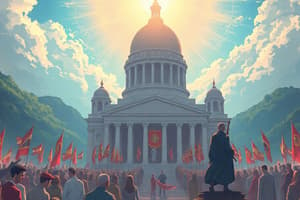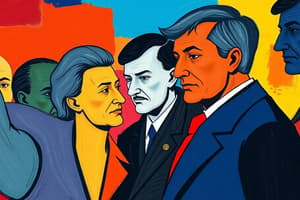Podcast
Questions and Answers
Which of the following is a disadvantage of presidential systems?
Which of the following is a disadvantage of presidential systems?
- Direct election of the president
- Clear separation of powers
- Difficulty in removing the president (correct)
- Stability in leadership
Democracy is primarily defined as a government system where the authority is held by a single ruler.
Democracy is primarily defined as a government system where the authority is held by a single ruler.
False (B)
What is a 'vote of no confidence'?
What is a 'vote of no confidence'?
A vote by a legislative body to express disapproval of the government.
In a democracy, factors like voter turnout, political participation, and the rule of _______ measure performance.
In a democracy, factors like voter turnout, political participation, and the rule of _______ measure performance.
Match the government systems with their advantages or disadvantages:
Match the government systems with their advantages or disadvantages:
What typically leads to higher success rates in mandatory referendums?
What typically leads to higher success rates in mandatory referendums?
Voter turnout is the only indicator of a healthy democracy.
Voter turnout is the only indicator of a healthy democracy.
Name an advantage of federal systems of governance.
Name an advantage of federal systems of governance.
The role of _______ refers to the formal process through which individuals or groups make decisions that impact society.
The role of _______ refers to the formal process through which individuals or groups make decisions that impact society.
Which of the following is a potential issue with direct democracy?
Which of the following is a potential issue with direct democracy?
Political parties solely focus on their internal electoral strategies and do not represent public interests.
Political parties solely focus on their internal electoral strategies and do not represent public interests.
What term describes the legal or institutional representation by elected officials?
What term describes the legal or institutional representation by elected officials?
Unequal descriptive representation can lead to feelings of ______ and inequality.
Unequal descriptive representation can lead to feelings of ______ and inequality.
Match the following terms with their definitions:
Match the following terms with their definitions:
Which statement best describes lobbying?
Which statement best describes lobbying?
More representation of marginalized groups can improve policy outcomes.
More representation of marginalized groups can improve policy outcomes.
What defines the 'descriptive representation'?
What defines the 'descriptive representation'?
In a ______, laws are introduced by the government usually formed by the majority party.
In a ______, laws are introduced by the government usually formed by the majority party.
Personal reasons for voting include all of the following EXCEPT:
Personal reasons for voting include all of the following EXCEPT:
Flashcards
Democracy definition
Democracy definition
Government where people rule directly or through elected reps. Emphasizes individual rights, equality, and rule of law.
Vote of no confidence
Vote of no confidence
Legislative body votes to show disapproval of the government. Can lead to resignation.
Question of confidence
Question of confidence
Government question to affirm its authority to the legislative body.
Presidential system advantages
Presidential system advantages
Signup and view all the flashcards
Voter turnout
Voter turnout
Signup and view all the flashcards
Presidential system disadvantages
Presidential system disadvantages
Signup and view all the flashcards
Federalism advantages
Federalism advantages
Signup and view all the flashcards
Federalism disadvantages
Federalism disadvantages
Signup and view all the flashcards
Majority voting
Majority voting
Signup and view all the flashcards
Proportional voting
Proportional voting
Signup and view all the flashcards
Direct Democracy Drawbacks
Direct Democracy Drawbacks
Signup and view all the flashcards
Personal Voting Motivations
Personal Voting Motivations
Signup and view all the flashcards
Political Parties' Role
Political Parties' Role
Signup and view all the flashcards
Lobbying Issues
Lobbying Issues
Signup and view all the flashcards
MP Roles
MP Roles
Signup and view all the flashcards
Parliamentarianism vs. Presidentialism
Parliamentarianism vs. Presidentialism
Signup and view all the flashcards
Formal Representation
Formal Representation
Signup and view all the flashcards
Symbolic Representation
Symbolic Representation
Signup and view all the flashcards
Unequal Representation Consequences
Unequal Representation Consequences
Signup and view all the flashcards
Descriptive Representation
Descriptive Representation
Signup and view all the flashcards
Study Notes
Exam Preparation Answers - Study Notes
- Politics: Defined as the process where individuals or groups make decisions impacting society. Involves power, authority, governance, laws, policies, decision-making, public/private interests, and conflict/cooperation
- Cantonal Governments Subsidies: Some cantonal governments in certain regions subsidize daycare fees more than others (question 2)
- Democracy: A form of government where power rests with the people, either directly or through elected representatives. Emphasizes individual rights, equality, and the rule of law (question 3)
- Voter Turnout: A measure of democratic participation, but not a perfect indicator of health, influenced by factors like compulsory voting or election frequency (question 4)
- Democracy Performance Metrics: Factors like voter turnout, political participation, accountability, rule of law, and conflict resolution skills can assess a democracy's success (question 5)
- Confidence/No Confidence Votes: A 'confidence vote' affirms a government's legitimacy. 'No confidence vote' expresses disapproval, potentially leading to the government's resignation (question 6)
- Presidential vs. Parliamentary Systems: Presidential systems feature clear separation of powers, direct presidential election, and often greater stability, but can risk authoritarianism and difficulty removing the president. Parliamentary systems involve potential political gridlock and may result in fewer resources spent on public goods (questions 7, 8)
- Federalism Advantages and Disadvantages: Federal systems promote local autonomy, accommodate diversity, and allow for tailored policies, but they can also lead to inequality between regions, complicated governance and conflicts between federal and state governments (question 9)
- Political Figures/Institutions: Joe Biden (USA), Council of States (Switzerland), Federal President of Germany (question 10)
- Voting Systems: Majority, proportional voting systems exist for voting procedures (question 11)
- Referendums: Mandatory referendums have higher success rates due to legal requirements, unlike optional ones which rely more on voter mobilization (question 13)
- Direct Democracy: Challenges include potential voter fatigue, oversimplified complex issues, and vulnerability to manipulation by special interest groups (question 14)
- Political Preferences, Attitudes, Beliefs: Voters may base decisions on their political party, preferred candidates, or ideologies, attitudes or beliefs (question 15)
- Voting Motivations: Reasons include party loyalty, candidate trust, personal values, and alignment with political ideologies (question 16)
- Political Parties: Parties organize elections, represent public interests, formulate policies, recruit candidates, and uphold democratic accountability (question 17)
- Sovereign State Collaboration (International Relations): Function as a link between sovereign states in a comprehensive network (question 18)
- Lobbying's Impact on Democracy: Potential for disproportionate influence by powerful interest groups and undermining democratic processes (question 19)
- MP Roles: Elected officials can act as trustees or delegates, representing the interests of constituents or their parties (question 20)
- Presidential vs. Parliamentary Processes: Parliamentary systems have laws introduced by the government, while presidential systems often involve laws originating from and being executed by the president (question 21)
- Electorate Representation: Descriptive representation describes political institutions' composition, while symbolic representation focuses on how groups feel about the representation (question 22)
- Representation & Inclusion: Unequal representation can lead to disenfranchisement and inequality. Efforts towards diverse representation can create social justice and policy improvements (question 23)
Studying That Suits You
Use AI to generate personalized quizzes and flashcards to suit your learning preferences.




